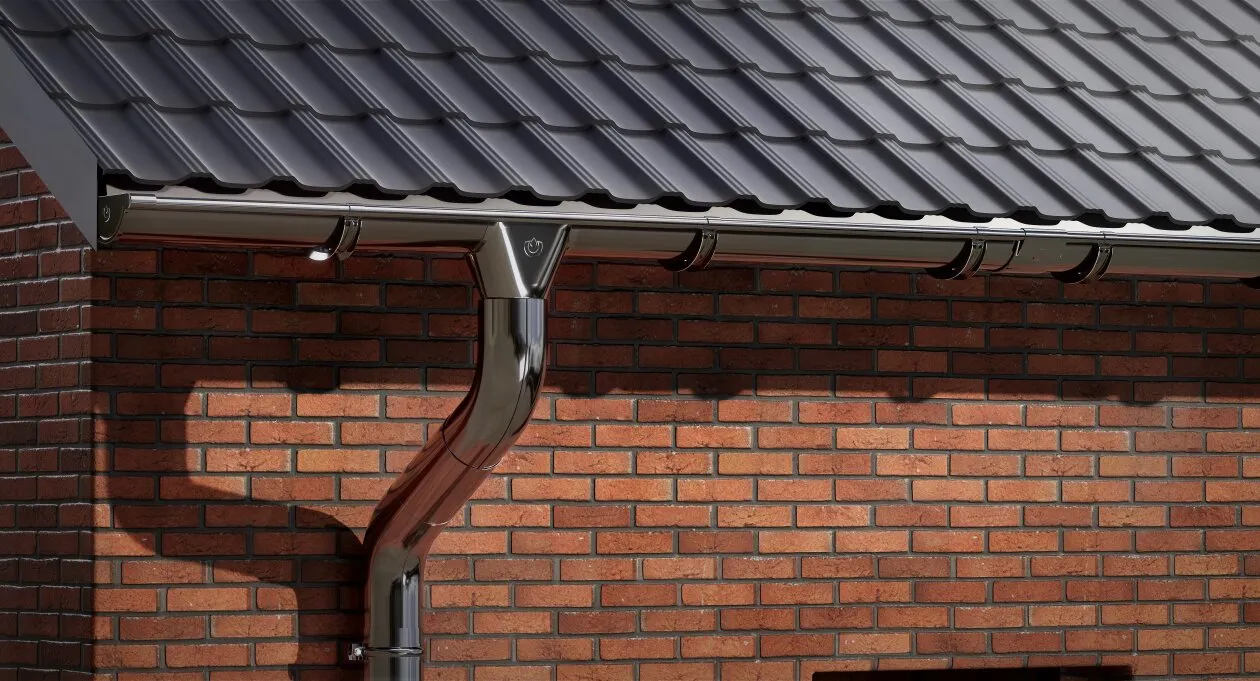Choosing the right gutters – steel or plastic?

Selecting the right gutters to ensure effective drainage is important regardless of the type of building. Thanks to them, water will not run down the walls of the property or penetrate the foundations. But which gutters should you choose? On the market, you will find both steel and plastic options. These two solutions differ in their properties, durability, appearance, and price. So, let’s find out whether steel or plastic gutters will be the better choice.
Steel gutters – advantages and disadvantages
Steel gutters have been used for a very long time and are valued above all for their durability. They are extremely resistant to temperature fluctuations and heavy loads. By choosing high-quality metal gutters, you also don’t need to worry about corrosion. All this makes them a reliable solution for many years and – thanks to their aesthetics – suitable for both modern and traditional buildings.
Do steel gutters have any drawbacks? Yes, although not many. When scratched or improperly installed, they can become prone to rust, and their installation is usually not the easiest. It often requires specialist knowledge and tools.
Plastic gutters – advantages and disadvantages
An increasingly common alternative to metal systems is plastic (PVC) gutters. Modern manufacturing technologies and high-quality materials make them highly durable and resistant to scratches. A major advantage of PVC gutters is their light weight, which makes them easy to transport and install. Moreover, their smooth surface allows water to flow quickly and minimises the risk of dirt build-up inside. They are also available in a wide range of colours, making it easy to match them to any building.
The disadvantages of plastic gutters include their sensitivity to temperature changes – PVC gutters expand and contract more significantly, which means proper installation of fittings is essential for the system to function correctly. They are also difficult to repair if damaged (for example, if cracked).
Plastic vs. metal gutters – key differences
Both high-quality steel and plastic gutters can be used to create a durable and functional drainage system. However, in some cases, steel products will perform better, while in others, PVC will be the smarter choice.
Steel systems are far more durable, easier to repair, and more resistant to temperature fluctuations and heavy loads.
Where do plastic gutters come out on top? They are completely resistant to corrosion, require no maintenance, and are easier to transport and install.
Plastic vs. metal gutters – price
Investors often compare prices when deciding on the right gutters. Here, PVC solutions have the advantage, as they are usually cheaper than their steel counterparts.
Although the differences are not dramatic, they can affect the total cost, especially for larger projects. That’s why it is worth keeping this in mind when making your choice.
Steel or plastic gutters – which should you choose?
The answer to this question is not straightforward, as the gutter system should primarily be matched to the building’s characteristics as well as the type and size of the roof.
Steel gutters are recommended for properties located in sunny areas and in places with heavy snowfall (for example, in the mountains). They are also an ideal match for metal roofing such as sheet tiles or metal shingles. PVC gutters, on the other hand, are better suited to areas with many trees and in less sun-exposed locations, so they are not constantly exposed to UV radiation.
Regardless of whether you opt for steel or plastic gutters, remember to invest only in top-quality products. This way, you can be certain they will withstand challenging conditions and remain reliable even after many years of use. Choosing the right guttering system will ensure efficient water drainage for your home or any other property – a decision that always pays off in the long run.
